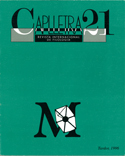Història inèdita de la llengua catalana
DOI:
https://doi.org/10.7203/caplletra.21.7349Palabras clave:
català, Renaixença, regionalisme, sociolingüística Resumen
Resumen
In this article, which first appeared in 1983, some thoughts are given to the status of Catalan since the Spanish political transition into democracy. The purpose is to show how present «important» opinionmakers base themselves on an escapist fantasy which replaces real history, which in tur prevents us to study the real past and thus conceive and propose a real future for the language. An analysis is made of the significance of the Renaixença and how this movement considered Catalan as lost. In fact, the ultimate aspirations of regionalists were nowhere near the minimum requirements of a modern European linguistic community. Therefore, the present return to the idyllic recovery practised by the Renaixença is considered even more brutally simplistic and fantastic than what the Renaixença meant. This different analysis of the present situations involves a change in mentality, a different way of thinking. Such mentality must enable us to clarify, not only the wiles coming from outside, but first and foremost, the internal obstacles presented by Catalan society itself.
 Descargas
Descargas
Descargas
Publicado
Cómo citar
-
Resumen429
-
PDF (Català)270
Número
Sección
Licencia
El autor o autora que dirija un trabajo a la redacción de Caplletra para ser publicado tiene que ser la persona titular legítima de los derechos de explotación. La legitimación para la publicación del trabajo tiene que incluir también las imágenes, las tablas, los gráficos y otros materiales que puedan complementar el texto, con independencia de si es su autor o autora.
Copyright. Al publicar el trabajo en la revista, el autor o autora cede a Caplletra. Revista Internacional de Filologia los derechos de explotación (reproducción, distribución y comunicación pública), tanto para la edición impresa en papel como para la versión electrónica.
Todos los trabajos publicados en Caplletra se encuentran bajo una licencia Creative Commons del tipo Reconocimiento-NoComercial-SinObraDerivada 4.0.
RESPONSABILIDAD
Caplletra. Revista Internacional de Filologia no se identifica necesariamente con los puntos de vista sostenidos en los trabajos que publica.Caplletra. Revista Internacional de Filologia declina toda responsabilidad derivada de cualquier vulneración eventual de los derechos de propiedad intelectual que pudiera ser llevada a cabo por los autores o autoras.






